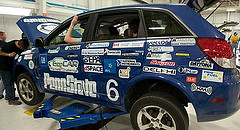
UNIVERSITY PARK – Students from Penn State won fourth place and brought home a number of other awards at the EcoCAR: The NeXt Challenge competition, held in Milford, Mich., and Washington, D.C. Sponsored by General Motors (GM) and the U.S. Department of Energy, the competition challenged university students across North America to re-engineer a GM-donated Saturn VUE, with goals to improve fuel efficiency and reduce emissions while retaining the vehicle’s performance and consumer appeal.
More than 40 Penn State graduate and undergraduate students from a range of academic disciplines were involved in the preparation for this year’s competition, headquartered at the Larson Institute’s Hybrid and Hydrogen Vehicle Research Laboratory on the University Park Campus. This year’s event was the third in three years and was the culminating competition of the challenge. Penn State’s Advanced Vehicle Technology Team placed fourth overall out of the 16 North American universities for their design of a 1.3-liter-series hybrid extended-range electric vehicle that runs on B20 biodiesel.
“The team is thrilled to have placed fourth overall in year three and take home a handful of trophies,” said faculty adviser Gary Neal. “The students are what this competition is all about, and they truly stepped up in Milford and Washington, D.C. to secure a respectable finish against very difficult competition.”
“Three years of long hours in the garage have paid off,” said team leader Mike Zahradnik, a senior in aerospace engineering. “EcoCAR provided us all with a rewarding and valuable collegiate experience.”
Zahradnik can attest to that personally; he has already accepted a job with headline sponsor AVL as a result of working with EcoCAR for three years.
Over the last academic year, EcoCAR teams have spent countless hours refining their prototype advanced technology vehicles to be judged in more than a dozen technical events at this year’s competition finals.
In year two, the teams implemented vehicle designs that were simulated in year one to create a fully functional vehicle that underwent dynamic vehicle testing in May, 2010. Penn State placed third overall in the year two competition.
The EcoCAR team’s vehicle design was able to achieve an average fuel economy of 57 mpg. The vehicle has an estimated electric range of 30 miles, and uses a 1.3-liter diesel engine to drive an electric generator that produces electricity to power the vehicle. An electronic traction system is used to propel the vehicle.
Penn State already has earned a berth in the next competition, EcoCAR 2, a three-year program that will require student teams to explore a variety of power-train architectures, focusing on electric-drive vehicle technology.
In addition to the overall fourth-place finish, the team also won the following awards: Overall Safety Award, Editor’s Choice Award, Best Outreach Progress Reports Award, Spirit of Outreach Award, AVL Drive Quality Award, Fastest Autocross Award, Runner up for Lowest Fuel Consumption, and Best Well-to-Wheel Greenhouse Gas Award.
Team members who participated in the on-site competition at Milford and Washington, D.C., include Derek Bailey, Katie Davis, Andrew Eldridge, Dave Fecek, Shawn Getty, Mike Grady, Allison Lilly, Emily Pasi, Max Ripepi, Jake Ross, Luke Shepley and Mike Zahradnik. To see a full listing of team members, visit online.
The team from Virginia Tech took top honors for their design, and Ohio State won second place.
For more information about the Penn State Advanced Vehicle Team and EcoCAR Challenge, visit here or here online.
The competition was organized by Argonne National Laboratory with lead corporate sponsor GM and numerous competition-level sponsors. Local team resources and support were provided by cfdesign, BAE Systems, the Pennsylvania Department of Environmental Protection through their Alternative Fuels Incentive Grant program, the Thomas D. Larson Pennsylvania Transportation Institute, the Penn State Institutes of Energy and the Environment, the Learning Factory, the College of Engineering, the College of Earth and Mineral Sciences, the Department of Mechanical and Nuclear Engineering, the Department of Electrical Engineering, the Energy Institute, UPAC, GW Auto and Goodyear.


